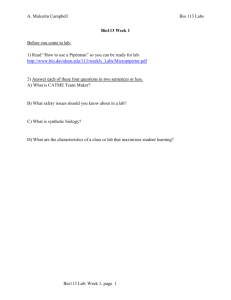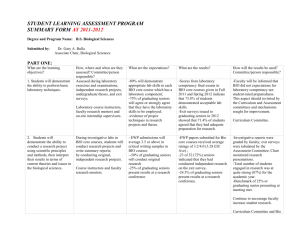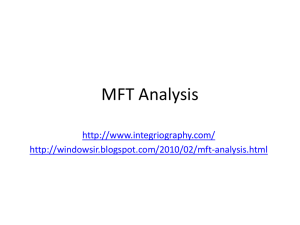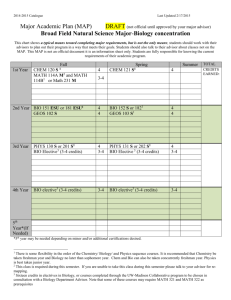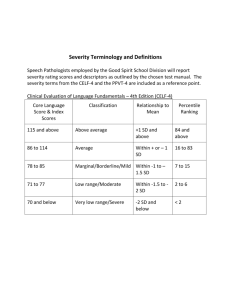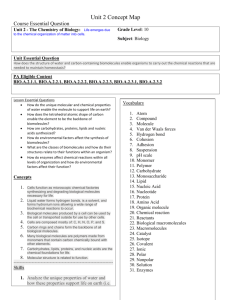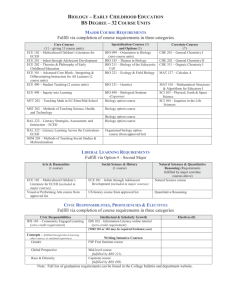Student Learning Assessment Program
advertisement
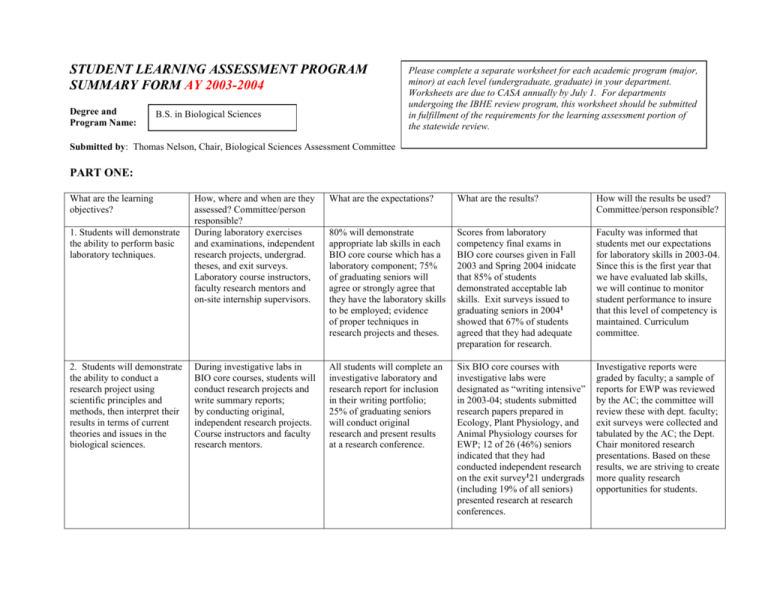
STUDENT LEARNING ASSESSMENT PROGRAM SUMMARY FORM AY 2003-2004 Degree and Program Name: B.S. in Biological Sciences Please complete a separate worksheet for each academic program (major, minor) at each level (undergraduate, graduate) in your department. Worksheets are due to CASA annually by July 1. For departments undergoing the IBHE review program, this worksheet should be submitted in fulfillment of the requirements for the learning assessment portion of the statewide review. Submitted by: Thomas Nelson, Chair, Biological Sciences Assessment Committee PART ONE: What are the learning objectives? 1. Students will demonstrate the ability to perform basic laboratory techniques. 2. Students will demonstrate the ability to conduct a research project using scientific principles and methods, then interpret their results in terms of current theories and issues in the biological sciences. How, where and when are they assessed? Committee/person responsible? During laboratory exercises and examinations, independent research projects, undergrad. theses, and exit surveys. Laboratory course instructors, faculty research mentors and on-site internship supervisors. What are the expectations? What are the results? How will the results be used? Committee/person responsible? 80% will demonstrate appropriate lab skills in each BIO core course which has a laboratory component; 75% of graduating seniors will agree or strongly agree that they have the laboratory skills to be employed; evidence of proper techniques in research projects and theses. Scores from laboratory competency final exams in BIO core courses given in Fall 2003 and Spring 2004 inidcate that 85% of students demonstrated acceptable lab skills. Exit surveys issued to graduating seniors in 20041 showed that 67% of students agreed that they had adequate preparation for research. Faculty was informed that students met our expectations for laboratory skills in 2003-04. Since this is the first year that we have evaluated lab skills, we will continue to monitor student performance to insure that this level of competency is maintained. Curriculum committee. During investigative labs in BIO core courses, students will conduct research projects and write summary reports; by conducting original, independent research projects. Course instructors and faculty research mentors. All students will complete an investigative laboratory and research report for inclusion in their writing portfolio; 25% of graduating seniors will conduct original research and present results at a research conference. Six BIO core courses with investigative labs were designated as “writing intensive” in 2003-04; students submitted research papers prepared in Ecology, Plant Physiology, and Animal Physiology courses for EWP; 12 of 26 (46%) seniors indicated that they had conducted independent research on the exit survey121 undergrads (including 19% of all seniors) presented research at research conferences. Investigative reports were graded by faculty; a sample of reports for EWP was reviewed by the AC; the committee will review these with dept. faculty; exit surveys were collected and tabulated by the AC; the Dept. Chair monitored research presentations. Based on these results, we are striving to create more quality research opportunities for students. 3. Students will demonstrate an understanding of key principles, terms, and theories in the 4 subfields of biology covered by the BIO core curriculum: cell biology, molecular biology and genetics, organismal biology, ecology and evolution. Major field test (MFT) completed in senior capstone course (BIO 4984) during spring semester. Instructors of capstone course, who submit tests to chair of AC. The chair of AC submits exams to ETS Testing Service for grading. Mean total score for EIU students above the 50th percentile. Mean subscores in cell biology, molecular bio. and genetics, organismal biology, and ecology & evolution above the 50th percentile. EIU students scored in the 75th percentile in total MFT scores2. Subscores in all 4 subfields exceeded the 50th percentile, ranging from the 55th percentile in cell biology and molecular biology to the 90th percentile in ecology and evolution2. This is the first year that students exceeded expectations in all areas. MFT results were tabulated by the AC and will be distributed to faculty by the Dept. Chair. After consultation with the faculty, contents of the BIO core curriculum will be reviewed and revised if necessary to strengthen students knowledge. Revision of the curriculum is the responsibility of the faculty, coordinated by the Dept. Curriculum Comm. Students will demonstrate the quantitative and analytical skills to analyze data sets generated by biological experiments and surveys. During lab exercises, exams and research projects; MFT subscore in analytical skills. Instructors in BIO core courses and the senior capstone course. 80% will demonstrate proficiency by attaining grades of C or higher on laboratory finals. Mean subscore for graduating seniors above the 50th percentile. 85% of students earned grades of C or higher on laboratory finals in the BIO core courses. Graduating seniors scored in the 55th percentile on the analytical component of the MFT in 2004. Analytical scores on the MFT have differed substantially during the first 4 years. Before curriculum revisions are suggested, we prefer to review the results of this tool for another 2-3 years. AC and Dept.Chair monitor and report. Students will demonstrate the ability to critically read and evaluate research papers and review articles in the biological sciences. Research report written for inclusion in writing portfolio; term paper written for senior capstone course (BIO 4984); analytical subscore on MFT. Instructors in BIO core courses and the senior capstone course. MFT scores tabulated and reported by AC. 80% will demonstrate proficiency by attaining grades of C or higher on research report and term paper. Mean analytical subscore for MFT above the 50th percentile. Graduating seniors scored in the 55th percentile on the analytical component of the MFT in 2004. 88% earned grades of C or higher on BIO 4984 capstone term paper. Analytical scores on the MFT have differed substantially during the first 4 years. Before curriculum changes are initiated, we will review the results of this tool for another 2-3 years. Research reports and term papers have been satisfactory. MFT scores are monitored by AC; reports are graded by individual instructors and reviewed by Dept. Chair. PART TWO: Summarize changes and improvements in curriculum, instruction, and learning that have resulted from the implementation of your assessment program. While this section should focus on the current academic year, some departments may find it useful to discuss trends in longitudinal data. I. Major Field Test: Results and Trends (Appendix 2) Results of the Major Field Test in Biological Sciences indicate that EIU BIO majors competed very successfully with ~20,000 biology majors from 342 colleges and universities, scoring in the 55th percentile nationally. Scores improved in two subfields (cell biology and molecular biology & genetics) that have been areas of concern for the department. These improvements also are reflected in higher scores in three related assessment indicators: biochemistry, molecular biology, and cell structure & function. Since this is the first group of students that graduated under our current curriculum, these improved scores may indicate that adjustments that we made in the core curriculum are better preparing graduates in these important areas. Scores remained high in ecology & evolution, as well as in organismal biology, areas that have been traditionally emphasized in the curriculum. A continuing area of concern is the low scores that our students have earned in animal structure and function. For the third consecutive year, our graduates scored below the 30th percentile on this indicator. The faculty in future meetings will discuss these trends. II. Exit Surveys: Results and Trends (Appendix 1) Twenty-six graduating seniors, approximately 50% of the students surveyed, completed exit surveys. We are disappointed with the low returns on this survey, but believe that this sample is representative of all graduates. Several encouraging trends are evident in this 4-year longitudinal survey. Students overwhelmingly see the faculty as knowledgeable, positive, and helpful. Laboratory exercises are perceived as improving; 81% of students agreed that labs are modern, organized, and appropriate, up from 56% 3 years ago. Furthermore, students’ perceptions of graduate teaching assistants is improving. Eighty-five percent of students reported that TAs were knowledgeable and helpful; up from 53% three years ago. This has been an area of concern and the department has made concerted efforts to effectively mentor and monitor TAs. Undergraduate participation in research continues to increase. Approximately 25% of all graduates conducted independent research and many presented their results at conferences. Now that the library renovation is complete, positive perceptions of the library system have increased. Support for the textbook rental service remains high. Participation in Botany Club, Zoology Club, and the honor societies has increased. Ninety-two percent of graduates believe that they made the right choice in selecting the Biological Sciences major. The survey also highlights several areas of concern. Students generally do not think that the department provides enough career advice. Similarly, they report that more information on internships is needed. Few (29%) of the student interns reported that their on-site supervisors were supportive and knowledgeable. This appears to be a developing problem and is the third consecutive year that the perception of supervisors has declined, falling from 82% to 29% in 4 years. The faculty and department chair will address these problems next year. III. Curriculum: Reviews, Changes and Prospectus The curriculum was evaluated in April 2004 by an external review team from the Council for Undergraduate Research (CUR). Comments from the 3-person team were generally positive. The team noted that our curriculum was similar to numerous others throughout the nation. They applauded our strengths in organismal biology, providing students with field experiences, and encouraging research projects as course requirements. However, they expressed concerns about low MFT scores in cell and molecular biology and suggested that we consider adding the Cell & Molecular Biology course to the core curriculum. These recommendations will be discussed in future department meetings. The faculty considered and passed a proposal to change the grading of Independent Research (BIO 3450 and 3451) from letter grades to credit/no credit. The department designated 2 more courses as “writing intensive”, bringing our total number of these courses to 20. Writing intensive courses are well-distributed throughout the BIO curriculum, including 5 lower division honors courses, 6 core courses and 9 upper division courses.

